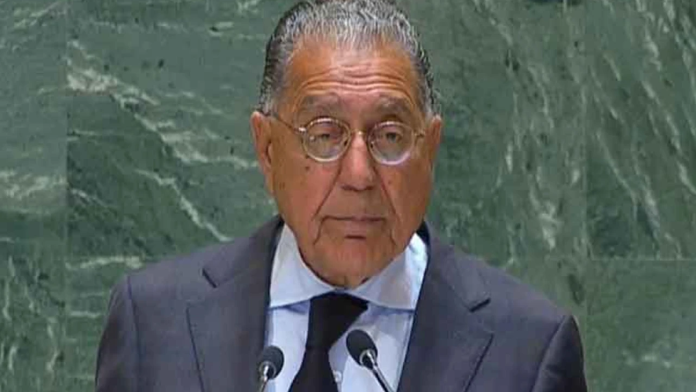UNITED NATIONS, Oct 10 (APP):Pakistan has called on the UN Security Council to thoroughly investigate the “recurring” incidents of theft and illicit sale of nuclear and other radioactive materials in neighbouring India.
A recent Indian media report said that police had arrested three smugglers in the western Gopalganj district of Bihar with a rare Californium stone which is highly radioactive and fetches a high price in the international market.
“The Security Council should be deeply concerned at the recurring incidents of theft and illicit sale of nuclear and other radioactive materials in our Eastern neighbour,” Ambassador Munir Akram, permanent representative of Pakistan to the UN, told a committee established by the 15-member Council pursuant to its resolution 1540 that requires UN member states to take specific steps to prevent the proliferation of weapons of mass destruction (WMD).
“In the latest incident last August 2024, a group was found in illegal possession of a large quantity of highly radioactive and toxic substance Californium, worth US$ 100 million,” he said, adding that three incidents of theft of Californium were reported also in India in 2021.
These incidents, Ambassador Akram suggested the existence of a black market for sensitive materials.
At the same time, the Pakistani envoy said, “While preventing non-state actors from acquiring sensitive materials, rights of States to peaceful use of dual-use technologies must be safeguarded. Export-control regimes should not serve as tools of coercion and discrimination.”
Under the terms of resolution1540, the Security Council demands that all States refrain from providing any form of support to non-state actors that attempt to develop, acquire, manufacture, possess, transport, transfer, or use nuclear, chemical, or biological weapons and their means of delivery, in particular for terrorist purposes.
The resolution requires all States to adopt and enforce appropriate laws to this effect as well as other effective measures to prevent the proliferation of these weapons and their means of delivery to non-state actors, in particular for terrorist purposes.
In his remarks, Ambassador Akram told the committee that Pakistan, as a responsible nuclear weapons state, had participated actively, in the formulation and negotiation of UNSC’s Resolution 1540, and implemented its obligations under it.
“We have established: a robust command and control system; a rigorous legislative, administrative, and enforcement mechanism to regulate the transfer of sensitive goods and technologies; and a comprehensive export control regime of the highest international standards,” the Pakistani envoy said..
Pakistan, he said, had submitted six reports, including a comprehensive matrix; appointed the National Point of Contact; adopted a voluntary National Action Plan; offered technical assistance to several countries to help implement the 1540 resolution; and promoted regional cooperation for effective implementation of the resolution, including a “Regional Seminar on implementation of 1540” to share best practices and national experiences.
“Pakistan believes that the 1540 Committee should continue to focus on capacity building and voluntary assistance,” Ambassador Akram said, underscoring the need to further refine the assistance mechanism by enabling States to submit more specific assistance offers and requests corresponding to the various provisions of the 1540 matrix.

















